Unearth Your Next Hobby With These Expert-Recommended Metal Detectors
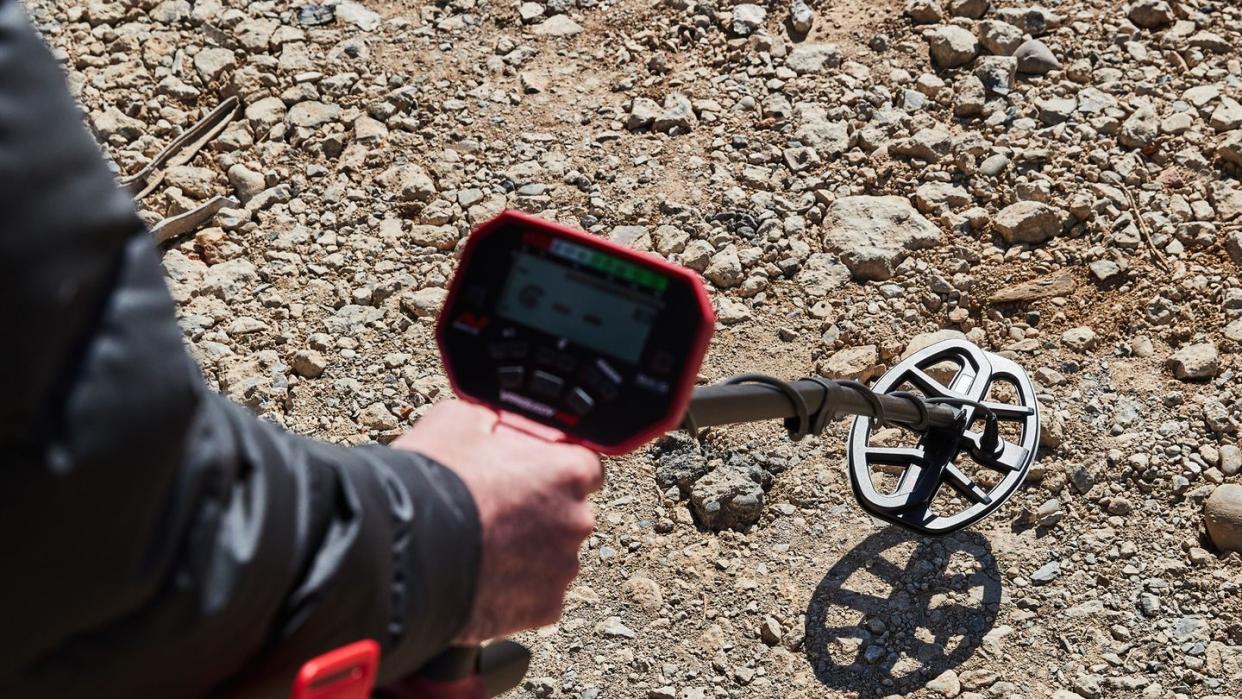
"Hearst Magazines and Yahoo may earn commission or revenue on some items through these links."
Whether stashed by Captain Kidd or as a plot point in The Goonies, buried treasure has a certain allure to it. But while metal detecting is a well-established hobby with thousands of dedicated adherents, it can be difficult to get started. Though easy to use, some metal detectors are made to be easy enough for a child to use, while comparing hobby-grade gear can feel confusing and overwhelming.
Whether you want to dig for gold like a prospector or spend hours combing the beach with your fun new machine, there’s a large range of detectors out there, many of which are optimized for different finds and different terrain. After speaking with some very experienced users, we’ve compiled a list of the best metal detectors for everyone, from first-time users to aspiring explorers.
The Best Metal Detectors
Best Overall: Minelab Vanquish 440
Best Value: Garrett Ace Apex
Best for Beginners: Nokta Simplex Ultra Metal Detector
Simple and Portable: Garrett Ace 300
Best Expert Upgrade: Minelab Equinox 800
[table-of-contents] stripped
The Experts
Steven T. Wright: As a longtime nerd and technology writer, I’ve covered computers and tech products for almost 10 years at publications like PC Gamer, Ars Technica, and Polygon. To assemble this guide, I relied on the expertise of two seasoned metal detecting experts who have decades of experience in the field. I also relied on insights and recommendations from online guides, as well as reviews from both experts and users.
Stan Ross started metal detecting in 1971. In 2012, while living on the beachfront in Seal Beach, CA, he joined The Ring Finders, a directory of metal detecting specialists that help people find lost items for a small fee. He’s helped hundreds of people reclaim their lost keepsakes and sentimental items. Finding lost items for people has become a passion for him and a way to use his years of metal detecting experience.
Jeff Lubbert has been an avid metal detector since 1980 and joined The Ring Finders in 2010. He was named “Ring Finder of The Year” in 2011. In his decade-plus of service, he’s returned over 200 items to their owners, with a total estimated value exceeding $900,000. He is an active officeholder in Denver’s Eureka Treasure Hunters Club and the co-host of American Digger Magazine’s Relic Roundup, a weekly metal detecting podcast.
What To Consider in a Metal Detector
Before we talk about how to pick a metal detector, we should quickly explain how they work. Consumer metal detectors have a round head known as the "search coil," which is the part that actually does the detecting. There are two parts to the coil, the transmitter coil and the receiver coil.
When you turn it on, the detector sends an electrical current into the transmitter coil, creating an electromagnetic field that reaches down into the ground when the coil is held perpendicular to it. The magnetic field causes metal objects underground to give off their own magnetic fields, which the detector coil can read. The detector can determine how far underground an object is based on the relative strength of the opposing magnetic field.
Many detectors can also determine what kind of metal they’re detecting (within limits) by measuring an object’s phase shift, or the time it takes for the object to react when the transmitter coil changes its current. This technique, called “discrimination” can help you tell the difference between treasure and trash: That said, our experts are quick to note that discrimination is an imperfect technology, and it’s best not to always take it at its word.
Geography And Use Case
The first thing to look at before buying a metal detector is where you plan to use it, as some detectors are better equipped to scan specific types of terrain. For example, if you live near the coast and plan to sweep your local beach, you may want a different model than someone looking under hard soil in local parks.
There are three major types of metal detectors, in ascending order of cost: Very low frequency (VLF), multi-frequency, and pulse induction (PI).
Very low frequency detectors operate on one frequency at a time. According to Lubbert and Ross, they’re made for entry-level hobbyists looking for coins and jewelry, but won’t work well for gold prospecting or scanning saltwater beaches. Most VLF models allow users to switch between a number of frequencies, but rarely allow you to input a specific one yourself.
Multi-frequency detectors detect over a range of frequencies at the same time, making them a good choice for serious hobbyists, especially those who plan to search in wet conditions. They’re generally more expensive than their VLF counterparts, but they can be used in mineralized soil and saltwater beaches. They’re also usually larger than VLF machines, and not as user-friendly.
Pulse induction detectors are professional-grade equipment used for salvaging and serious gold prospecting. They use a different kind of technology than VLF and multi-frequency detectors, sending out short bursts of powerful current to scan deep under the earth.
While they can detect hard-to-reach metals, pulse induction detectors have more trouble telling one type of metal from another, forcing you to dig up every significant piece of metal they find. Gold prospectors and serious divers use pulse induction detectors on saltwater beaches and other mineralized ground, but they’re not for most hobbyists. They’re heavy and have a high learning curve. Plus, they cost thousands of dollars.
Coil Size
Both experts recommend checking the size of the metal detector coil, which spits out the electromagnetic field and actually finds the metal. If the coil doesn't sweep over the target, it won't detect it. "There's no beeping when you're near something like in the movies," Lubbert says. "You have to actually physically pass over it."
Ease Of Use
If you have a casually curious interest in metal detecting, both Lubbert and Ross recommend starting out with a VLF model, because they are less expensive and easier to use.
"I think it's more important to get a model that's more user-friendly to figure out if you actually like the hobby before you shell out $500 to $1,000 for a multi-frequency detector," Lubbert says. "There are much more important factors to consider than just buying the most expensive one you can afford just because you think it's the best."
Weight
The nature of metal detecting means that you'll have to lug your gear around, possibly for hours at a time. Given that, you should always check out the detector’s weight to make sure it's something you can handle. Some of our picks below also have retractable shafts, which makes them easy to stow in a small vehicle.
Battery Life
Most metal detectors last around 10 to 15 hours on a full charge, though it can vary a bit from model to model. More expensive detectors, such as the XP Deus II, will have a lithium-ion battery with a longer lifespan, while more affordable options stick to rechargeable AA batteries, which you can swap out or replace.
How We Selected The Best Metal Detectors
Most of the metal detectors in this guide were recommended by our experts based on the factors above. We also sifted through dozens of product listings, reviews from consumers and experts, as well as enthusiast guides from MetalDetector.com, UnderCoil, and more.
We looked to highlight a wide range of detectors to suit a variety of needs, from beginners looking to dip their toe in, to hobbyists looking for an upgrade. No matter where you stand, we have you covered.
Our Full Metal Detector Reviews
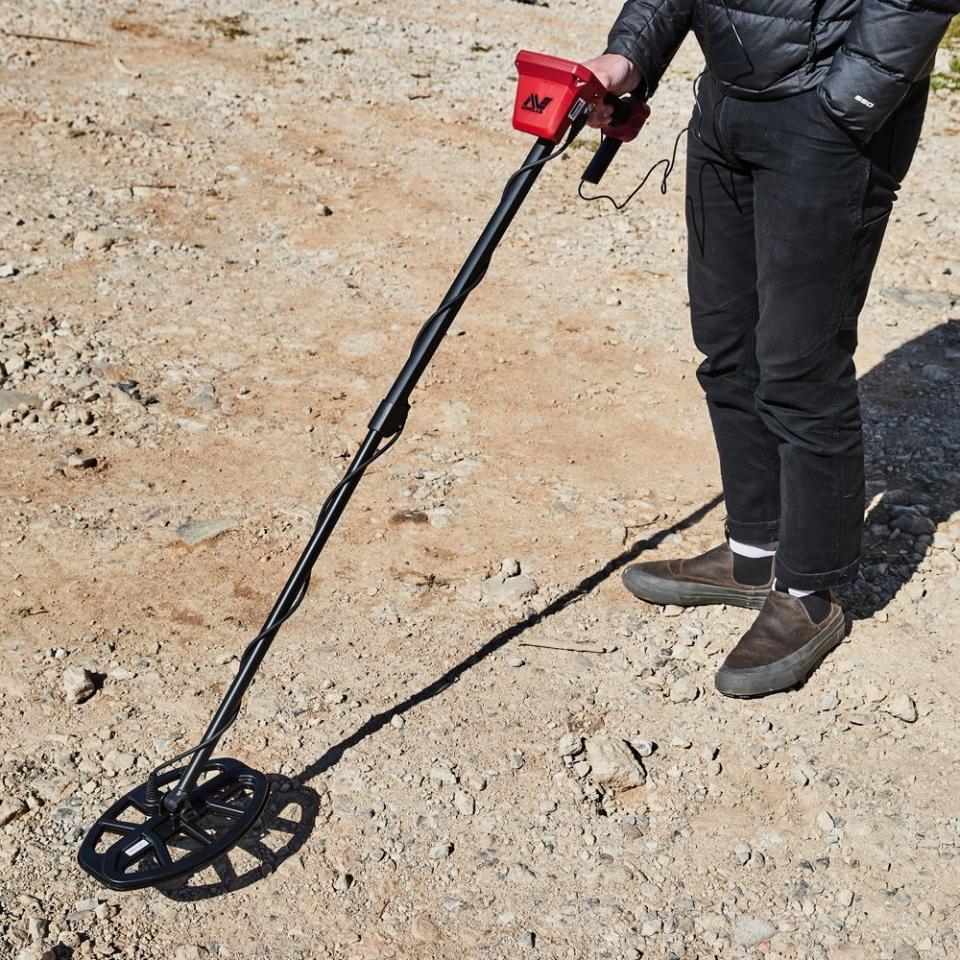
Vanquish 440 Metal Detector
amazon.com
$299.00
Trevor RaabThe Minelab Vanquish 440 offers a tremendous amount of functionality for less than the cost of some less powerful VLF detectors. For about $300, it’s a little more expensive than true entry-level models, but it offers a lot of features that enthusiasts look for.
Its four find modes support all different types of terrain, from turf to fields, and its multi-frequency technology allows it to search saltwater beaches without any problems. You can set and save your own frequency settings to figure out what works best for your area and search style.
Perhaps best of all, it weighs only 2.6 pounds. The Vanquish 440 is a true hobby-grade machine that you can grab for a great price.
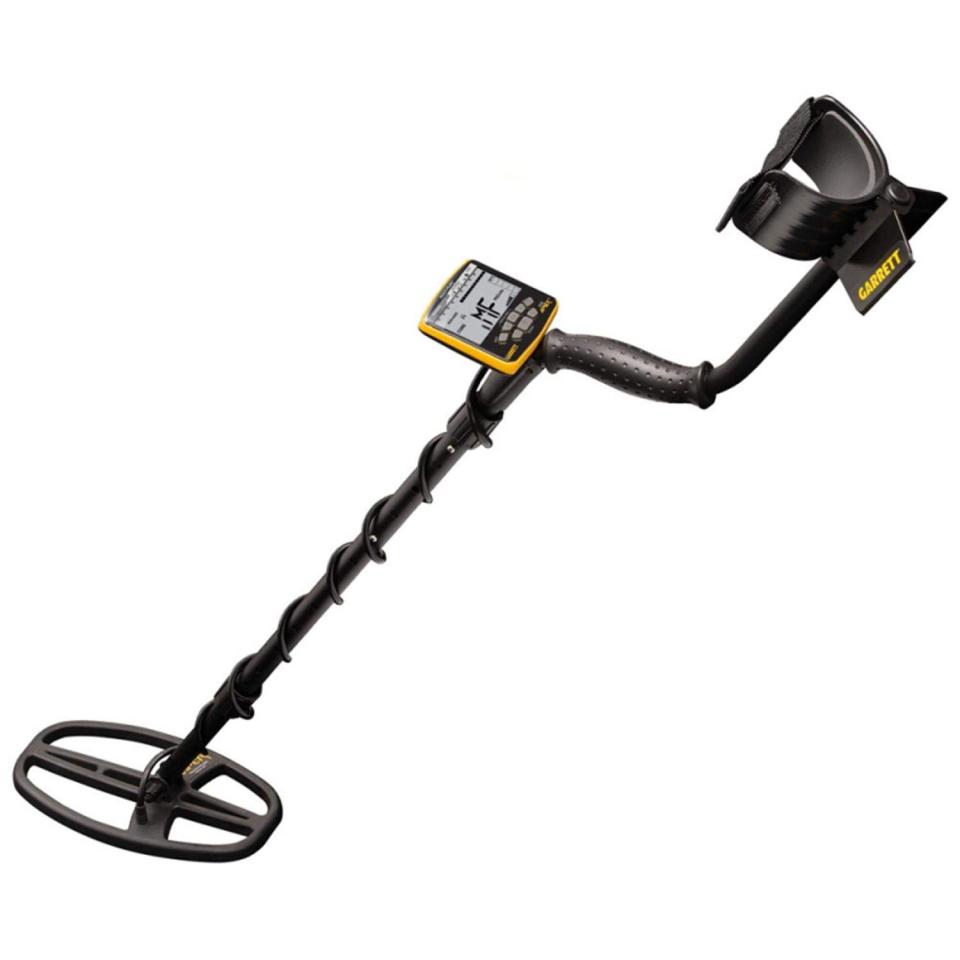
Ace Apex Metal Detector
amazon.com
$426.65
Lubbert called the Ace Apex one of the best value machines on the market. The flagship of Garrett’s Ace detector line, the Apex has a large backlit display and six detection modes, including specific finder settings for coins, US coins, jewelry, relics, and a custom setting.
The most interesting option is its “iron audio” feature, which helps you identify complex iron objects that you probably don’t want to dig up, such as bottle caps. Likewise, the notch discrimination feature lets you filter out certain frequencies if you’re trying to avoid metal trash.
The Garett Ace Apex is priced for knowledgeable enthusiasts, so it isn’t exactly cheap—you may notice that it costs more than our Best Overall pick— but you’re getting a lot of detector for the price, which makes it a great value. For a veteran hobbyist or a pro, it’s a great bargain.
One pro tip if you pick one up: Make sure to install the latest firmware update, as reviewers say it really improves the machine’s performance in the field.
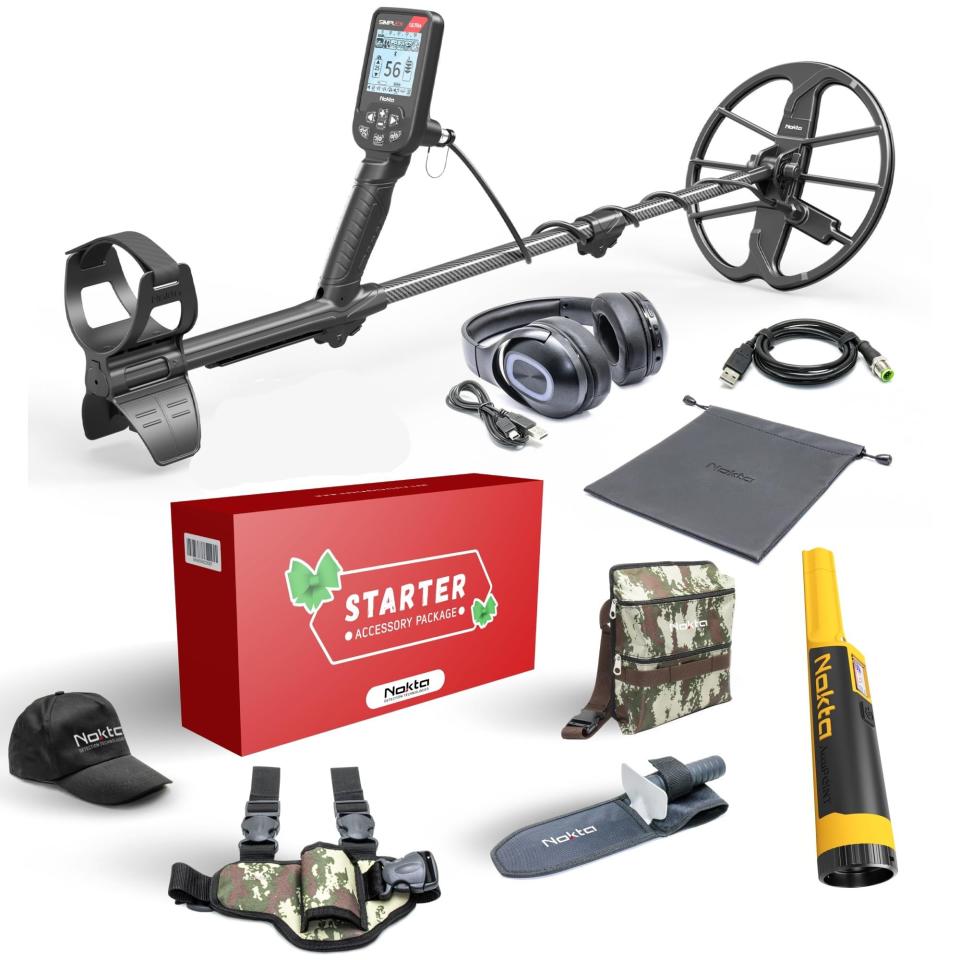
Simplex Ultra Metal Detector
amazon.com
$504.95
For years, the Nokta Simplex has been the gold standard for beginner-friendly metal detectors, and this new Ultra model continues that legacy. With six search modes, a backlit screen, and notch discrimination, it doesn’t require much fiddling to get it set up. That said, it’s a powerful machine that works well in a variety of conditions.
Those six settings include two multi-tone modes that allow you to use its discrimination to determine what exactly you’re detecting without even looking at the menu, which is a big plus. It’s also waterproof up to 16 feet, which is quite impressive for a model in its price range, making it especially good for freshwater conditions.
Because it is a VLF model, the Simplex Ultra is not as effective on saltwater beaches or mineralized soil as the more professional detectors on our list. As a whole, though, it punches above its weight, making it the perfect machine for anyone interested in learning the ropes of metal detecting.
We name this pick as a great option for beginners due to its simplicity and ease-of-use, rather than its price tag. Indeed, $500 is a lot to spend on a new hobby you may not be sure you'll keep practicing. On the other hand, if you think there's a good chance you'll stick with metal detecting, spending the extra money on a model that's easy and rewarding to use could be the difference that keeps you going back out rather than spending less money on a machine that's challenging to use.
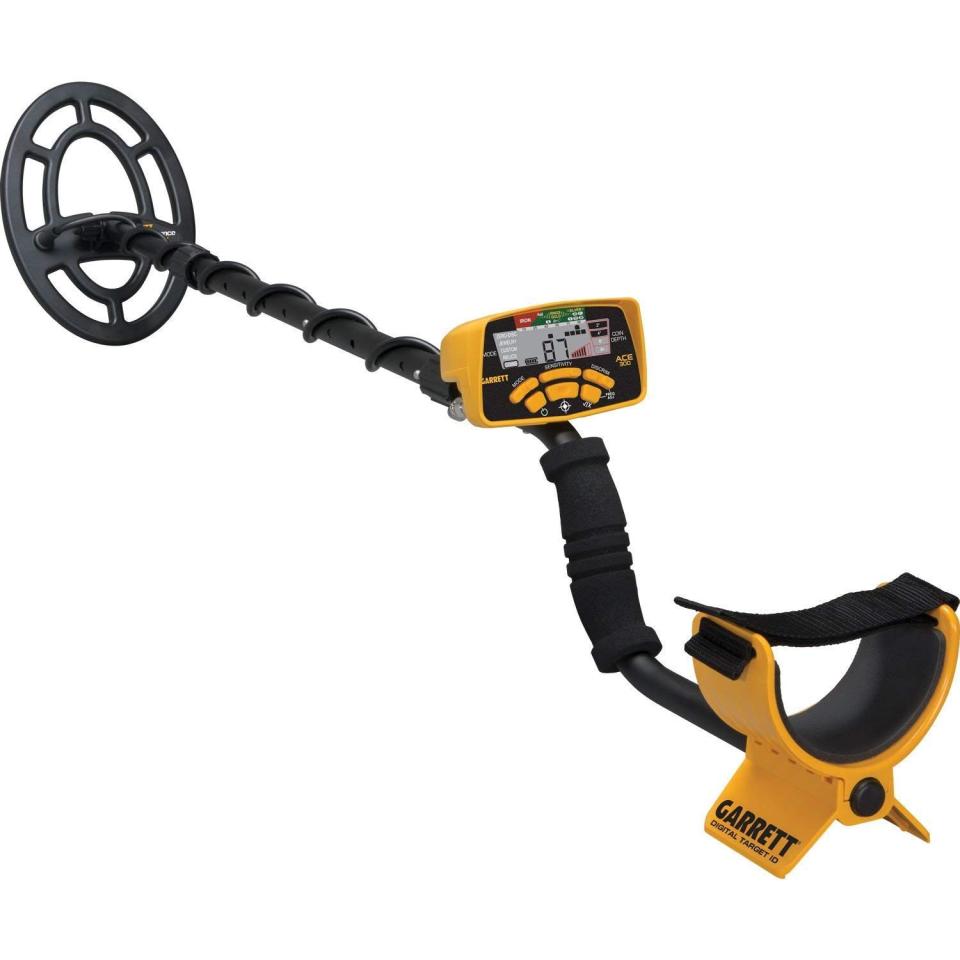
Ace 300 Metal Detector
amazon.com
$269.95
Considered an "old reliable" by hobbyists, the Garrett Ace 300 is an entry-level metal detector with meat-and-potatoes features. It has a large screen, a water resistant coil, and five search modes suitable for a variety of terrain, including dry beaches. It also has better pinpointing and iron identification modes than several other models in its price range.
Given its relatively low price, it shouldn’t come as a surprise that the Ace 300 lacks some of the finer flourishes found on premium detectors, such as a backlit screen and specific water resistance. Its default coil is also only 10 inches, though you can upgrade it with a larger one. Garrett is a name that detectorists trust, so it’s an easy recommendation to give to new hobbyists who aren’t too concerned about fancy bells and whistles.
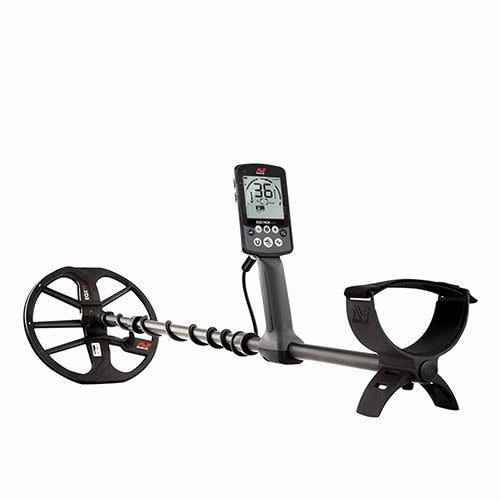
Equinox 800 Metal Detector
walmart.com
$949.00
Described by Ross as the best option for the “dedicated enthusiast,” the Minelab Equinox 800 is a multi-frequency detector capable of doing almost anything you’d want, especially at the beach. Its coil can pick up metal on wet sand, even while wading in saltwater.
Its four detection modes can find coins, jewelry, “relics,” and even gold nuggets on the most mineralized soil. Though it has fewer modes than some similar detectors, such as the Vanquish 440, a machine like the Equinox will likely find more metal and at a greater depth.
Ross uses the Minelab Equinox 800 for many of his jobs, and he’s used it while wading up to his neck in the ocean. Though it is lighter than most detectors, the fixed shaft length may make it hard to carry around, and reviewers say the length may make it hard to use for anyone shorter than 5-feet-6-inches. At double the price of our beginner and best overall picks, the Equinox 800 is definitely made for a discerning detector fan with a lot of experience.
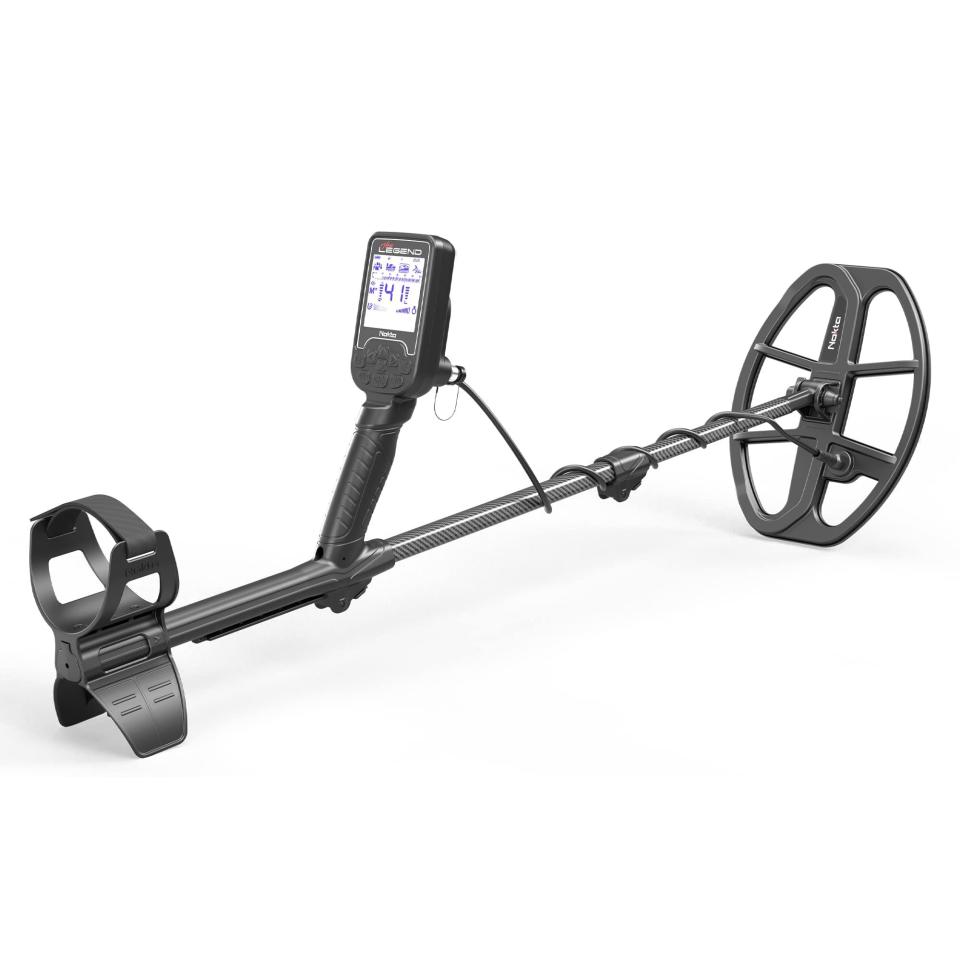
The Legend Waterproof Metal Detector
amazon.com
$595.00
If you’re interested in dipping your toe in the world of underwater metal detecting, you should take a look at Nokta’s “The Legend” waterproof detector. It’s up there with the Minelab Equinox 800 as one of the most recommended detectors for beaches and shallow water in the detector community. It’s far more affordable than the Equinox, though, and more beginner-friendly.
With four different detect modes, simultaneous multi-frequency scanning, and robust waterproofing, it's made for both freshwater and saltwater conditions and is an attractive mid-range option for those who are looking to spend a lot of time getting their ankles wet at the beach.
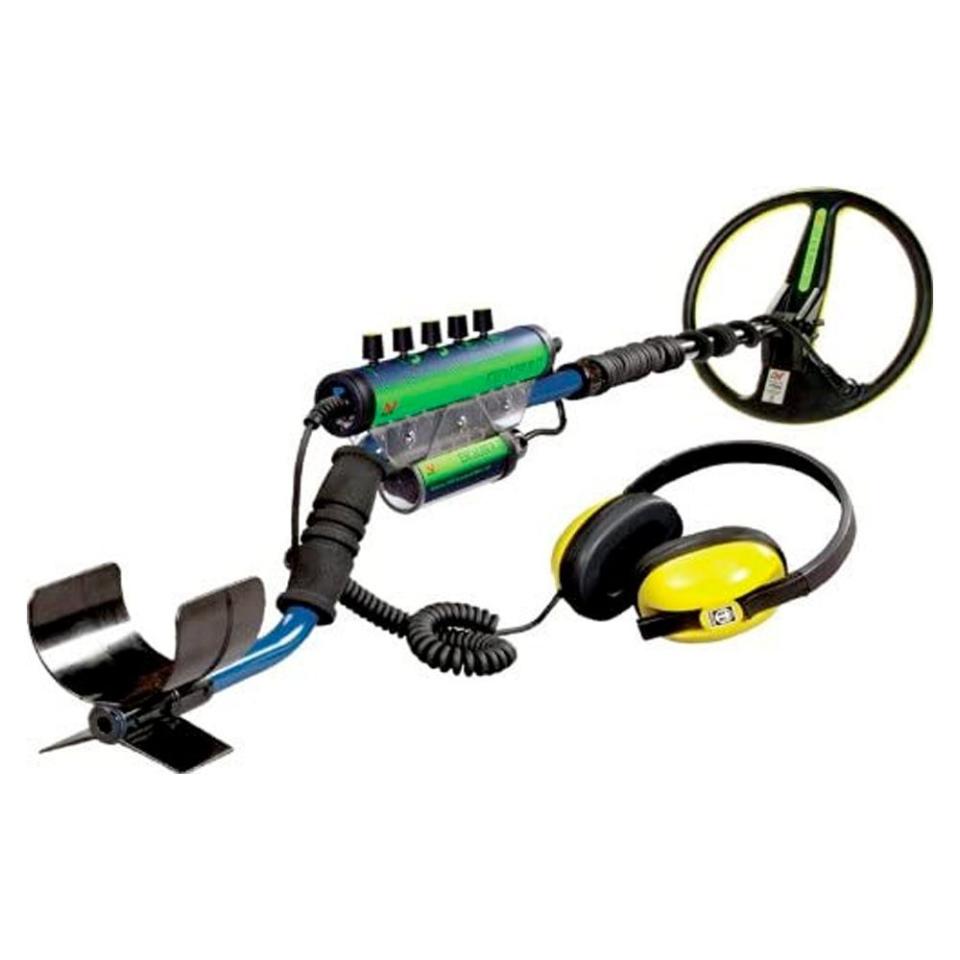
Excalibur II Underwater Metal Detector
amazon.com
$1699.00
The Minelab Excalibur II is designed for hardcore enthusiasts who want to take a metal detector on their snorkel or (more likely) scuba dive. Equipped with BBS multifrequency technology designed specifically to detect in saltwater or mineralized conditions, the Excalibur 2 detects in 17 frequencies simultaneously. (For comparison, the above Vanquish 440 scans on just five.)
It’s also a powerful piece of gear on land, though it’s heavier than most multi-frequency detectors, so it may not be the best choice out of the water. It also lacks the large screen you’ll find on other models: Instead, you control it with rotary dials that let you control its two detection modes.
The Excalibur II was created and optimized for a specific scenario. If you’re treasure diving, this is one of the best options on the market. If you’re looking for something to use at home and bring on the occasional underwater excursion, it may not be the best choice.
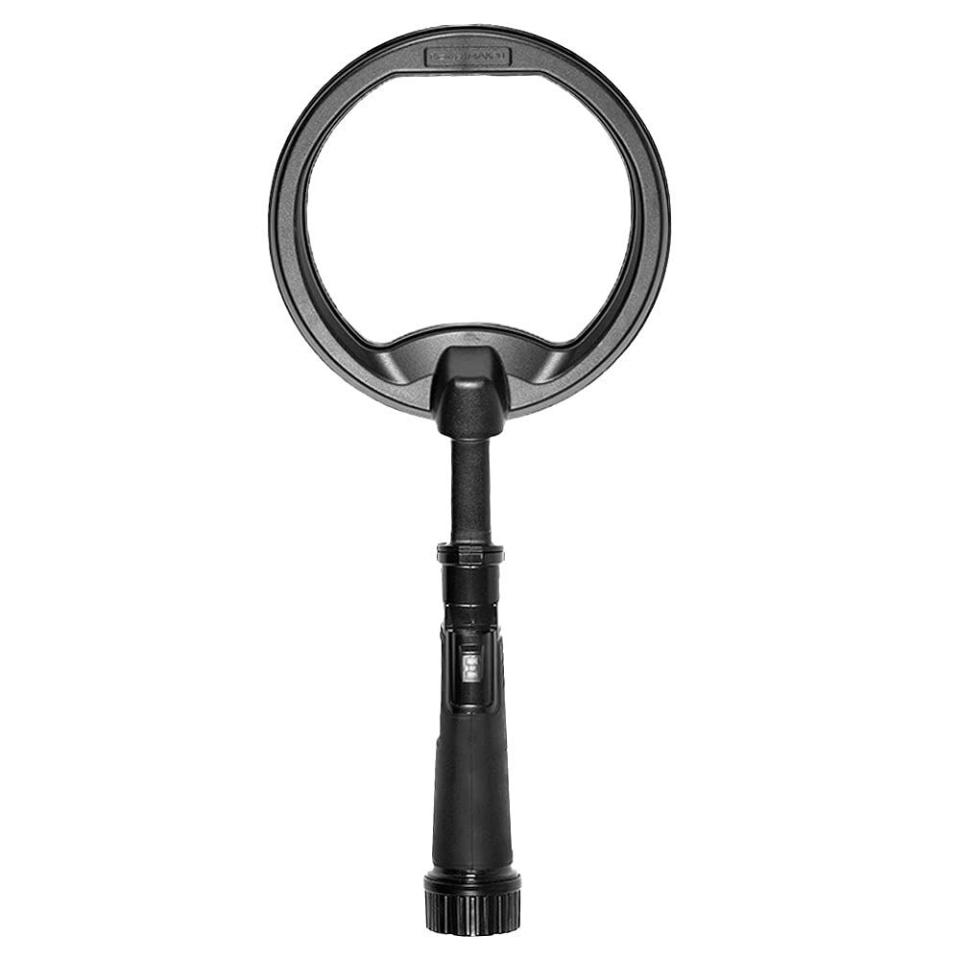
PulseDive Metal Detector
amazon.com
$169.69
If you want to bring a metal detector underwater, but you don’t have the budget for a high-end machine like the Excalibur II, the Nokta Makro PulseDive is a solid alternative for beginners. The PulseDive is what detectorists call a "pinpointer," which experts use to determine the precise location of a target after getting a reading with a larger, wide-ranging detector. While it doesn’t have the range for deep sea diving on its, it can still pick up underwater treasures in shallow water.
It isn’t a perfect experience. Since it’s a pulse induction detector, the PulseDive has no discrimination, so it can’t filter out common metals like iron from the gold you might hope to find. Though it can’t compete with a full detector, it is far more waterproof than many machines that cost more than double its price. Plus, even if you buy a higher-end detector later, our experts recommend having a good pinpointers like the PulseDive so you don’t waste time digging in the wrong place, so it’s a win-win. Bring it along on a snorkel, and you’re bound to have a good time.
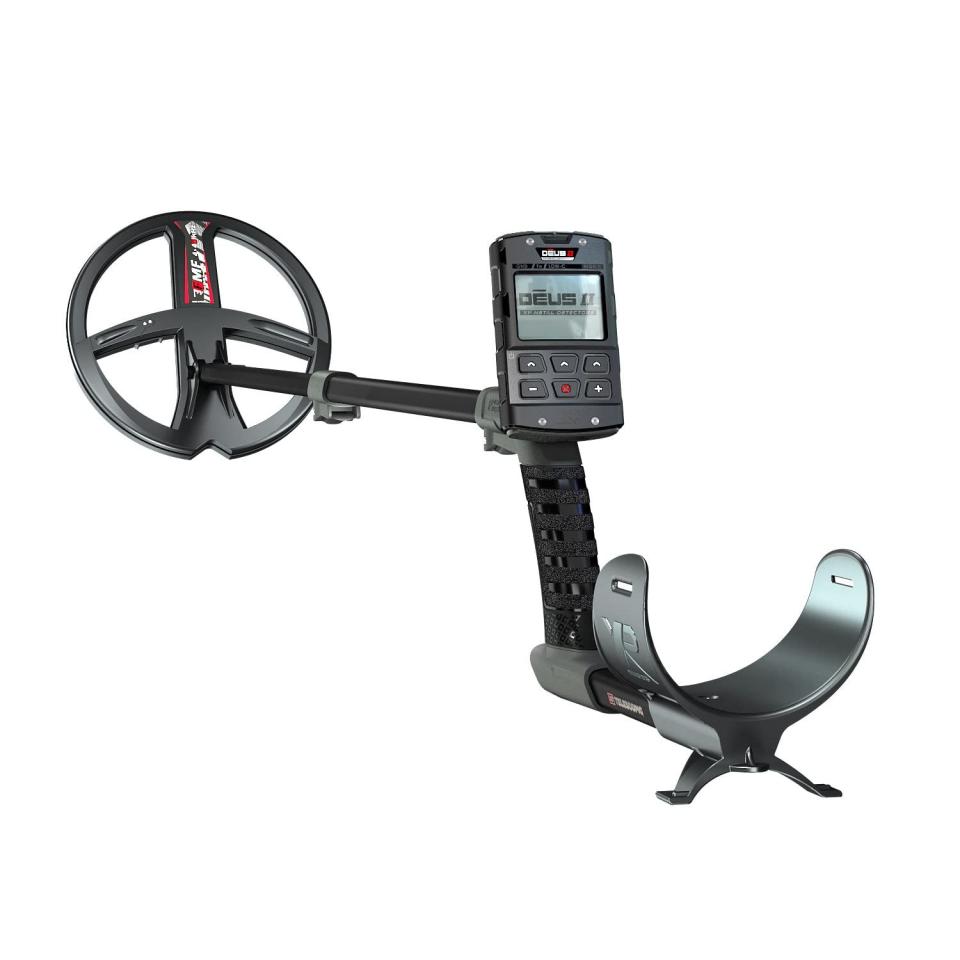
Deus II Metal Detector
amazon.com
$1199.00
Another machine that got high marks from both of our experts, the XP Deus II is the ultimate multi-frequency metal detector, with a price tag to match. Lubbert says the Deus II has the edge over several other detectors he loves in terms of speed and versatility. It features a whopping 12 different detection programs for every conceivable terrain, and has an additional 12 open slots for custom scans. It also has collapsible stems, so it’s more portable than many other detectors in its class.
It also comes with a wireless remote control that lets you adjust settings on the fly, and you can fit it with a special plug to bring it underwater. The Deus II is rated to dive to 66 feet, making it suitable for some underwater expeditions, wet beaches, and mineralized soil. It’s the ultimate upgrade for a veteran, despite its sky-high price tag.
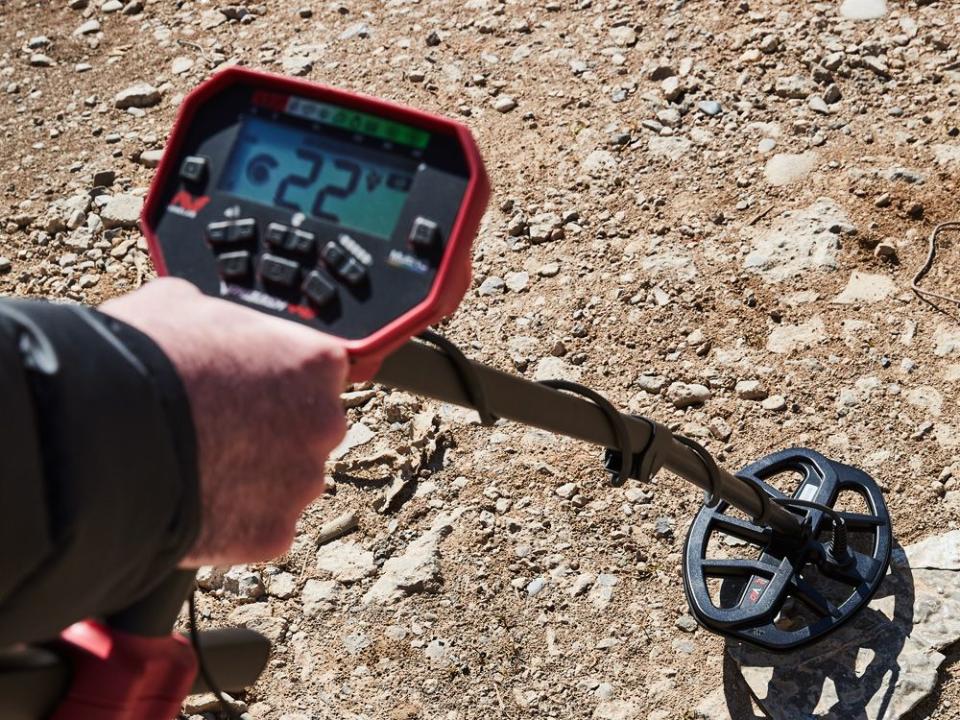
Q+A With Our Experts
How do I retrieve targets that I find using my metal detector?
Lubbert and Ross say that newcomers to the hobby often underestimate the importance of proper target retrieval equipment. By “target retrieval equipment,” we mean the gear you need to dig up whatever you find.
You should not plan to bring a large shovel when using your metal detector in public places, as local authorities and property owners generally frown on people digging large holes in parks and yards. (It’s also illegal in some jurisdictions, even when metal detecting isn’t.)
As with other aspects of metal detecting, you bring retrieval gear based on the terrain and soil you plan to scan. For example, sand scoops work well on dry sand, whereas you may need a trowel or Lesche digging tool–also known as a “soil knife”–for hard dirt.
You may also want to buy a pinpointer, which is a handheld metal detector with a tiny search coil that’s designed to help you narrow down the exact location of the target.
Lastly, you should learn proper digging techniques, such as the “flap” method, where you make three sides of a square with a sharp edge and lift the resulting flap with the edge of your tool. When you’re done digging, make sure to use a sod plug to fill in the resulting hole.
Where should I use my metal detector?
Finding a legal place to use your metal detector is not as easy as you might think. It’s illegal to use a detector in U.S. National Parks and historic battlefields. Many cities ban using them on public property, or require you to apply for a permit before using one. Make sure to check local city and county laws to determine if and where you may be allowed to use a metal detector and if you’ll need a permit to do so.
And, of course, if you plan to use your detector on private property, you should obtain permission from the owner, or else you might find a lawsuit instead of a treasure.
What can I expect to find with my metal detector?
Lubbert and Ross emphasize that newcomers to the hobby should not expect to find anything quickly. Locating anything other than rusty nails or worthless old coins takes dedication, practice, and above all, time. If you buy your detector expecting to go out every weekend and find something, you will be disappointed. Ross recommends joining a local hobby group to connect with fellow detector enthusiasts to scan with and discuss finds.
I want to go detecting with a friend. Will two detectors interfere with each other?
Unfortunately, yes. Two metal detectors operating on the same frequency will interfere with each other if they’re within 100 feet or so.
There is a potential solution though. If one of the detectors has a frequency shift function, you can switch to a different frequency and use them together.
That said, I’d say you’re better off sharing one detector and making it a cooperative activity, rather than having two people scan the same ground.
What other equipment do I need for metal detecting?
Lubbert and Ross said there are a large number of accessories that you can buy for your metal detector, though many of them are for more advanced and enthusiastic detectorists. For example, buying a carrying case for your metal detector can be helpful if you plan to use it frequently and it doesn’t come with one, as well as rechargeable batteries so you don’t run out in a pinch.
Similarly, a set of detector-friendly headphones will likely increase your efficiency, as it’ll allow you to hear the beeping and signals better than a speaker.
Additionally, if you plan to search underwater, proper swim gear and retrieval equipment is essential. Keep in mind that trying to dig underwater is more laborious than on land, so we recommend getting a decent handheld sand scoop. For beachcombers, you can buy a similar one on the end of a rod that works well, too.
You Might Also Like

